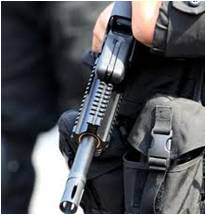Standards Squabble in Private Maritime Security
Source: Shiptalk
Private maritime security standards appear to be a bit like buses – you wait for years for one to turn up and then two arrive almost at once.
There appears to be some confusion in the security industry at the moment, as a new UK standard has been announced by the rather ominously named “Security in Complex Environments Group (SCEG)”. The group, which is a collective of UK based companies has announced their own standard. While over in the international camp, the Security Association for the Maritime Industry (SAMI) has developed a standard and accreditation process which was launched recently and which reportedly has a significant number of companies passing through it.
With seemingly competing standards it is perhaps easy to see where the confusion has arisen – but can the standards co-exist? Is it a case that the UK view will prevail, or will the international approach win out?
As things currently stand the SCEG standard still has a long way to go before companies can actually be accredited against it. There are also also some concerns that the standard is not solely focused on the maritime industry. The group quotes that the standard will also address, “accreditation for private security companies operating in complex or high-risk land environments such as Iraq and Afghanistan”.
This seems to be a problematic sticking point – here we have a unilateral move by a government to create a catch-all standard, which not only has a land focus, but which does not actually have a functioning mechanism supporting it. The group has admitted that there is still much work to be done, and significant funding to be raised to make their standard work.
Standards are incredibly important, and the SCEG and SAMI developments are both hugely significant, necessary and welcome. Those who increasingly rely on the security providers will, however, hope that the confusion does not distract from the benefits which can be derived from having private maritime security companies checked, vetted, accredited, call it what you will.
For the shipping industry it is perhaps a case of we don’t care who does it, just get it done. The IMO did some sterling work last year to produce a set of comprehensive, pragmatic guidelines and the SAMI standard has been based on these. Which is why many have been confused by the parallel work of SCEG.
Speaking to one observer, it has been suggested that the SCEG standard is a barrier which is being created to safeguard UK interests. The British government has woken slowly to the value of the UK maritime security industry – but now they have recognised it, they are looking at ways in which to guarantee its competitive advantage. However, this could come with added costs and burdens imposed on the UK PMSCs – in creating a mechanism to aid them, many are quietly concerned that they may struggle to take advantage.
From an international perspective, and of course, a shipping one – this is perhaps a moot point. It has been hoped that the IMO can once again provide some clarity, but they have backed away time and again from the idea of them accrediting PMSCs – and rightly so.
It would seem then, that it is the insurance industry which will decide which standards horse is backed. As underwriters look to balance the need for reassurance against not wishing to make life too onerous on the companies they wish to take premiums from, perhaps an international standard which is already up and running would be the far better bet.
Subscribe to our newsletter. Keep up to date with the weeks' piracy-related activity. It arrives in your inbox days before the online version, and does not require a document download.
OCEANUSLive.org


Information, Security, Safety; Shared
